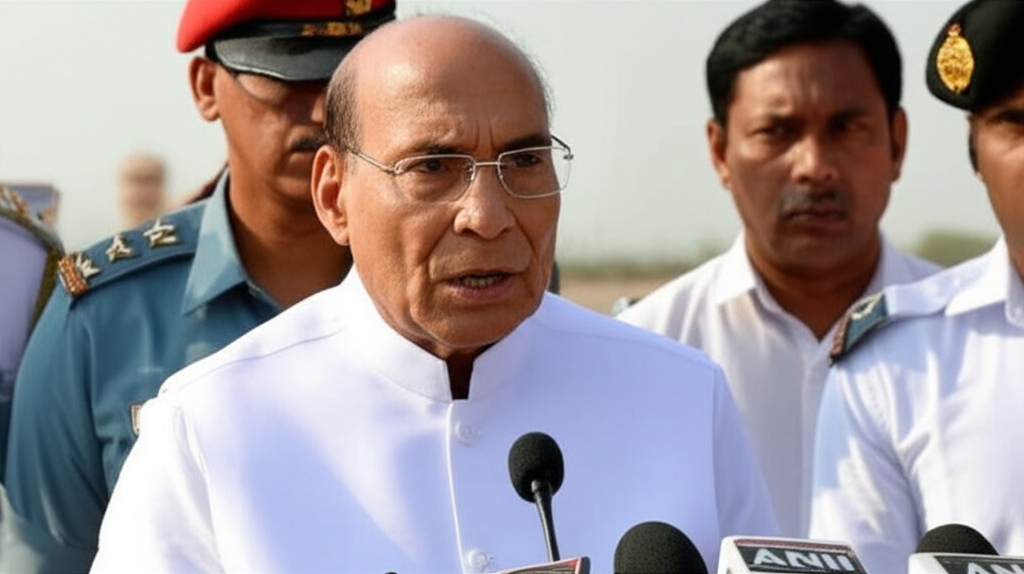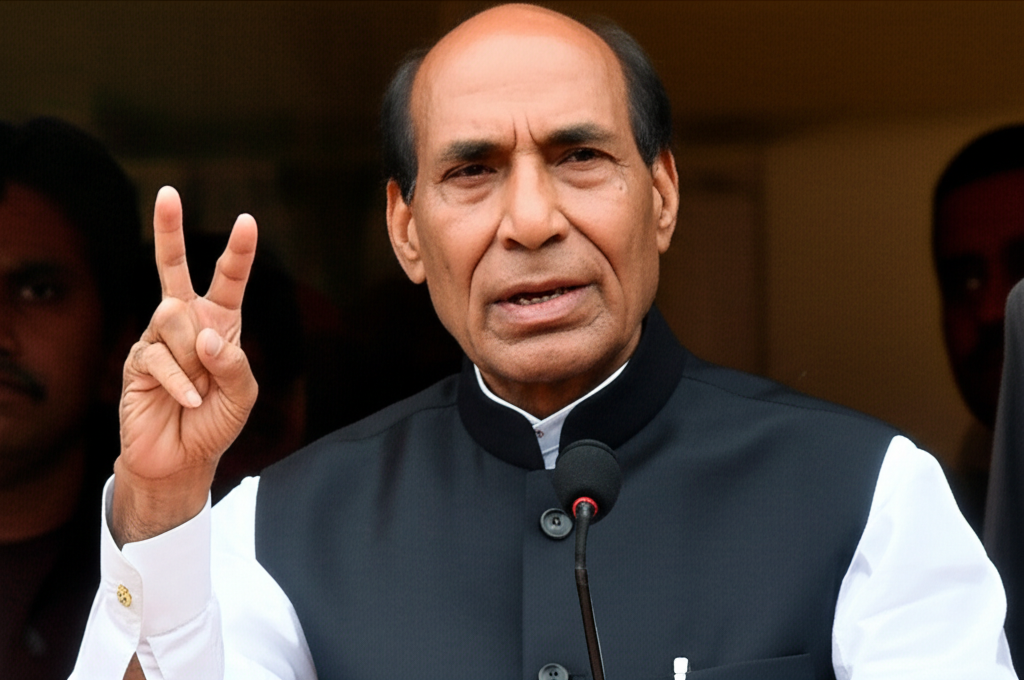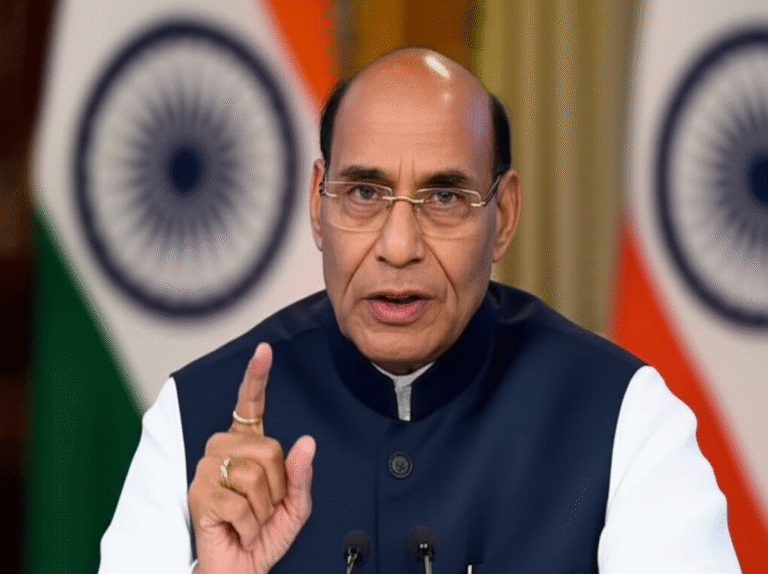
India’s Defence Minister, Rajnath Singh, has formally refuted assertions that the country’s recent military actions, known as Operation Sindoor, were halted due to external pressure. This clarification comes amid claims that third-party intervention, including from figures such as former U.S. President Donald Trump, played a role in the suspension of operations against Pakistan. The minister emphasized that the decision to suspend military activities was made solely by India, based on its own strategic assessments and timelines, and not as a result of mediation or influence from any other nation. This definitive statement aims to silence ongoing speculation and reinforce the narrative of India’s sovereign decision-making in matters of national security and defense policy. The government’s position is clear: India’s actions are dictated by its own interests and are not subject to external command or persuasion. The minister’s comments underscore a policy of strategic autonomy, asserting that India alone determines the course of its military engagements.

The statement directly counters suggestions that international diplomacy compelled India to cease its military operations. Mr. Singh was unequivocal in his assertion that no third party was involved in the decision-making process. He highlighted that while international actors may have opinions, India’s strategic choices are made independently. The repeated mention of external pressure in public discourse prompted this strong rebuttal, which serves to clarify India’s official stance. This position is further supported by recent admissions from within Pakistan. Ishaq Dar, Pakistan’s Deputy Prime Minister, acknowledged that India had rejected any form of third-party involvement in de-escalating the situation. This admission from a senior Pakistani official lends significant weight to India’s claims, confirming that the cessation of hostilities was not a product of brokered negotiations but a unilateral decision made by the Indian government on its own terms and conditions.
The Strategic Impact of Operation Sindoor
The military engagement in question, dubbed Operation Sindoor, was a significant demonstration of India’s military resolve and capability. The operation was not a random act but a calculated series of strikes aimed at specific targets. According to the information provided, these targets were identified as terror hubs located in Bahawalpur, Kotli, and Muridke inside Pakistan. The selection of these specific locations indicates a precise, intelligence-driven approach designed to dismantle infrastructure used for terrorist activities. By successfully targeting these hubs, India intended to send a clear message about its zero-tolerance policy towards terrorism and its ability to project power beyond its borders to protect its national interests. Operation Sindoor is thus framed not merely as a retaliatory measure but as a proactive step to degrade the capabilities of groups that threaten India’s security. The operation showcased India’s military strength and its readiness to take decisive action when necessary, reinforcing its position as a formidable regional power that acts on its own accord.
The broader implications of this operation and the subsequent statements from the Defence Minister are crucial for understanding India’s current defense posture. The official narrative consistently highlights that India’s actions are self-determined. The government maintains that it will not be swayed by international opinions or pressure when it comes to safeguarding its sovereignty and citizens. This principle of autonomous action is a cornerstone of the country’s foreign and defense policy. The minister’s statement is a reaffirmation of this long-standing doctrine. It communicates to both domestic and international audiences that India’s strategic calculus is internal and that any future decisions regarding military engagement will be made in New Delhi, based on its own threat perceptions and strategic objectives. This consistent messaging aims to build a credible deterrent and establish clear red lines for adversaries.
India’s Firm Stance on Sovereignty
The core of Defence Minister Rajnath Singh’s message was the unwavering sovereignty of India in its decision-making processes. He firmly dismissed any notion that the country’s military strategy could be dictated or influenced by external powers. This stance is particularly significant in the context of the complex geopolitical dynamics of the region, where third-party mediation has often been proposed or attempted. By stating that India suspended its operations on its own terms, the government reinforces its policy of bilateral engagement, or in this case, unilateral action, when it comes to disputes with Pakistan. This principle extends to rejecting any offers of mediation, a position India has held for decades. The minister’s clarification serves as a reminder that India perceives its security challenges as matters to be handled directly, without the need for international arbiters. This reinforces the country’s image as a self-reliant and assertive nation that takes full ownership of its foreign policy and national security strategies.

- India’s Defence Minister Rajnath Singh has denied that external pressure halted military operations against Pakistan.
- The minister stated that India suspended its actions, known as Operation Sindoor, on its own terms.
- The operation successfully targeted terror hubs located in Bahawalpur, Kotli, and Muridke in Pakistan.
- India has warned that it reserves the right to resume strikes if another attack occurs.
Furthermore, the context provided by Pakistan’s Deputy Prime Minister, Ishaq Dar, adds another layer to the situation. His admission that India refused any third-party involvement serves as external validation of India’s stated position. It effectively closes the loop on speculation, confirming from the other side that no mediated ceasefire was achieved. This alignment of statements, one from the Indian Defence Minister and the other from a senior Pakistani official, creates a consistent narrative that undermines any claims of a back-channel deal brokered by another country. It reinforces the idea that India’s decision to suspend operations was a calculated, strategic pause rather than a concession to international demands. This strengthens India’s diplomatic and strategic messaging, presenting a unified and unambiguous front on its operational independence and its approach to conflict resolution with its neighbor.
Background
The context for these statements revolves around recent military actions undertaken by India, referred to as Operation Sindoor. These operations were directed against what were described as terror hubs within Pakistan, specifically in the areas of Bahawalpur, Kotli, and Muridke. Following these actions, a period of de-escalation began, leading to public and media speculation about the reasons for the suspension of military strikes. Claims emerged suggesting that the halt was not a unilateral decision by India but rather the result of pressure from international actors, with specific mentions of figures like Donald Trump. These claims implied that a third party had successfully mediated a ceasefire, forcing India to pull back. It is this specific narrative that Defence Minister Rajnath Singh sought to dismantle with his public statement, asserting that India’s actions were entirely self-directed and not influenced by any external entity.
What’s Next

Looking ahead, the primary implication of Defence Minister Rajnath Singh’s statement is the reinforcement of India’s strategic autonomy. The declaration sends a clear signal that India will continue to make its own decisions regarding national security without seeking approval or consensus from other nations. A significant element of the minister’s message was a stern warning about the future. He explicitly stated that the suspension of military strikes is conditional and that operations could resume if India faces another attack. This forward-looking posture serves as a powerful deterrent, making it clear that the pause in operations should not be mistaken for a permanent cessation of hostilities. It establishes that India’s strategic patience has limits and that it retains the right to act decisively to protect itself. This stance ensures that India’s military options remain open, contingent on the actions of its adversaries, and that its defense policy will continue to be guided by its own assessment of threats and strategic interests. The international community and regional actors are thus put on notice that India’s military decisions are, and will remain, sovereign. [Source](https://timesofindia.indiatimes.com/videos/news/no-one-stopped-india-defence-minister-rajnath-singh-silences-operation-sindoor-ceasefire-claims/videoshow/123939922.cms)






